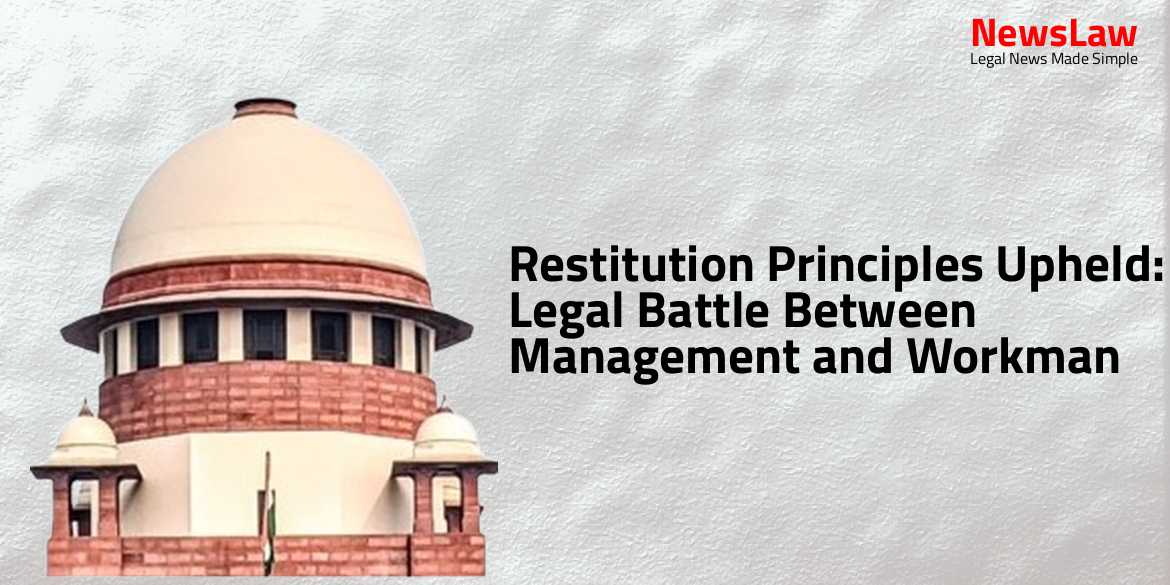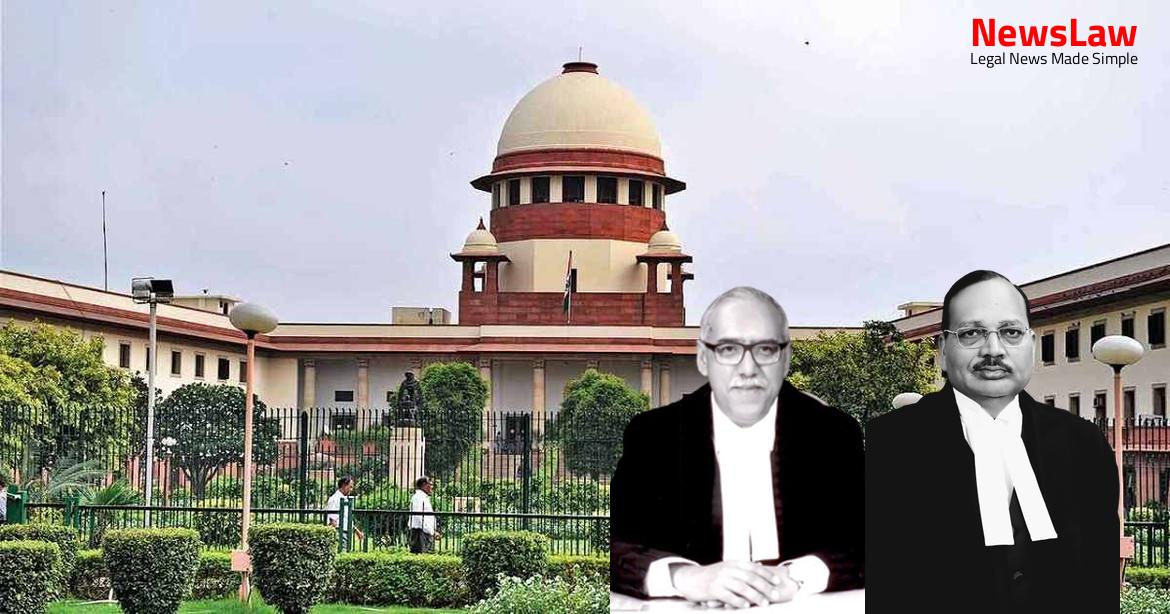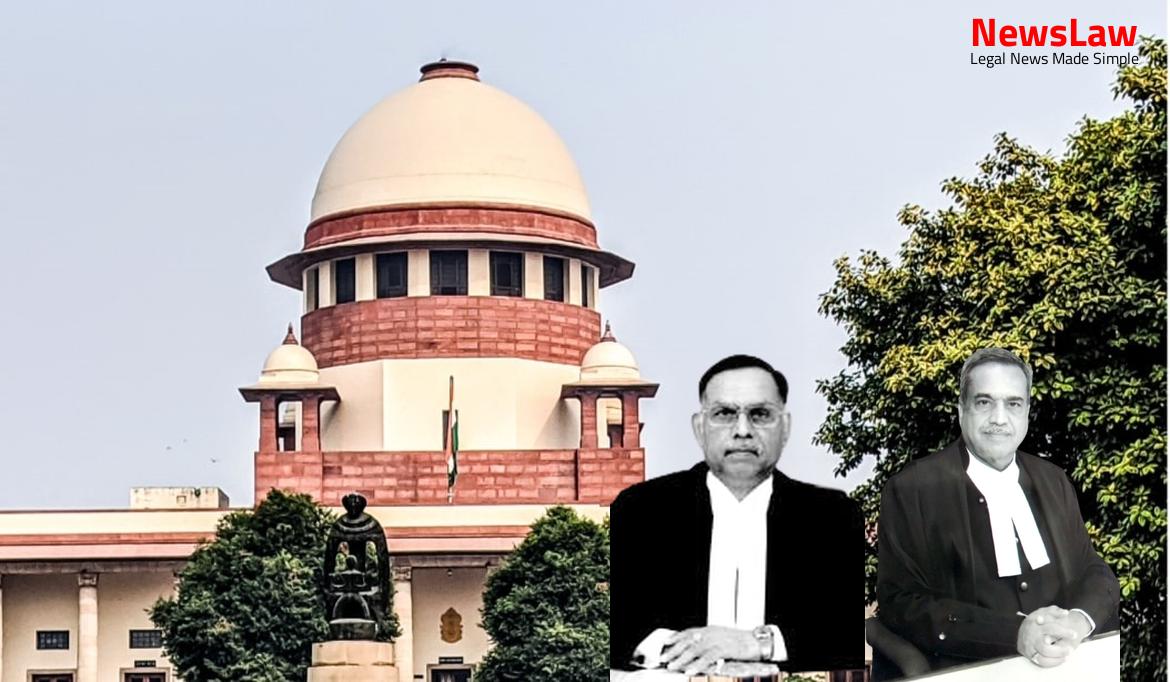In a recent judgment by the Delhi High Court, the principles of restitution were upheld in a legal battle between the management and a workman. The case revolved around the entitlement to fair compensation and the adherence to legal obligations. The court’s decision serves as a reminder of the significance of ensuring just outcomes in labor disputes.
Facts
- Workman failed to appreciate that the judgment of the Industrial Tribunal-I in the designation case does not provide a “skilled” designation as per the scheduled employment in the minimum rates of wages notified in Delhi.
- The workman has always received the salary prescribed for unskilled work and never objected to it during his employment.
- The stay was incorrectly connected to judgments of other cases with different facts, and there was no urgency from either party in seeking a stay on the impugned award.
- The Union did not pursue the implementation of the impugned award, indicating lack of urgency in the matter.
- The workman was employed as an unskilled laborer since 1994, as per the records.
- Sections 9A and 25-N of the Act were found to have no application in this case by the Labour Court.
- The claimant did not work with the management from the date of transfer until the date of rejoining.
- Management is obligated to provide retrenchment compensation as per Section 25-F for the period the workman actually worked.
- The transfer of 20 workers declared illegal by POIT was stayed by the Delhi High Court since 2006.
- Management was unjustified in including the period from transfer to rejoining in the total working period for calculating retrenchment compensation.
- Labour Court awarded the workman a lump-sum compensation of Rs.200,000 plus 9% interest per annum if not paid within a month of the award.
- Reinstatement was deemed not feasible as the management was nearing closure, hence entitlement to wages of skilled/semi-skilled category as per Labour Court.
- Back wages from the date of award till the High Court’s decision in 2008 to be decided by the High Court itself.
- Retrenchment compensation was deemed inadequate due to the inclusion of last drawn salary instead of skilled/semi-skilled worker wages as ordered by POIT in 2009.
Issue
- The Industrial Tribunal’s stayed award dated 29 September, 2009 is under question.
- The Workman in question was receiving the salary of ‘unskilled’ labor from the date of appointment until retrenchment.
- The issue at hand is whether the stayed award of the Industrial Tribunal can be considered by the Labour Court to determine the entitlement to compensation.
- The key issue to be decided is whether the Labour Court’s award should be reviewed under Article 226 of the Constitution of India.
Arguments
- It is argued by the petitioner that the impugned award was passed without considering all the facts and circumstances of the matter.
- The petitioner contends that despite transfer orders being deemed illegal by the Industrial Tribunal, the petitioner took back the worker on duty to avoid liability under section 17B of the Act.
- The petitioner is of the view that the worker is facing consequences because he formed a union to address grievances before labor authorities.
- The petitioner argues that the retrenchment compensation issue is not clear-cut and does not indicate any malicious intent on their part.
- The petitioner asserts that the writ jurisdiction of the Court does not allow for a re-examination of evidence and material already considered in the impugned award, especially when no illegality or perversity is shown by the petitioner.
- The petitioner submits that the impugned award was rightly passed by the learned Labour Court.
- The ARM argued that granting designation to the claimant has been stayed as the retrenchment compensation and notice pay were calculated correctly based on their last drawn wages, not as per the award dated 29.09.2009.
- The claimant had filed a case against their transfer, which was held by POIT that they were doing an unskilled job.
- The award regarding the claimant’s job status was not challenged by the claimant before any forum, making it final and operating as res-judicata.
Analysis
- The management erred in not calculating notice pay and compensation as per the 2009 award, violating Section 25-F of the Act.
- Management failed to include the workman’s service length in retrenchment compensation calculation.
- The Industrial Tribunal had designated the workman as skilled/semi-skilled, yet the management paid as an unskilled laborer, leading to inadequate compensation.
- The workman did not raise any dispute regarding wages or designation during their service, indicating they belong to the unskilled category.
- The learned Labour Court rightfully considered the designation awarded by the previous 2009 award in awarding compensation to the workmen.
- The attendance register and seniority list provided by management supported the workman’s claim for skilled/semi-skilled wages rather than as an unskilled laborer.
- The management’s violation of Section 25-F by failing to compensate the workman according to the skilled/semi-skilled category led to an inadequate retrenchment compensation.
- The stay on the 2009 designation matter did not excuse the management from paying proper compensation upon the workman’s retrenchment in 2010.
- The legality of the impugned award was upheld, considering all factual aspects and judicial pronouncements by the learned Labour Court.
- The failure to provide proper compensation to the workman as per the skilled designation constituted illegal retrenchment by the management.
- Evidence and documentation supported the workman’s entitlement to compensation based on the skilled/semi-skilled designation awarded in 2009.
- In Nava Bharat Ferro Alloys Limited v. Transmission Corporation of Andhra Pradesh Limited, the appellant challenged revised tariff rates and obtained an interim stay, but the demands for additional charges were upheld upon final decision.
- State of Rajasthan v. J.K. Synthetics Limited highlighted the importance of restitution and payment of interest in case of dismissed writ petitions.
- The case of the respondent workman involved a designation dispute, where the final decision upheld the award of the Industrial Tribunal and dismissed the writ petition filed by the management.
- The principles of restitution and restoring parties to their original positions were emphasized based on precedents like Shree Chamundi Mopeds Ltd.
- The court’s duty is to restore parties to their pre-stay positions as per the law and judicial precedents.
- The distinction between repeal and suspension of laws was established where repeal removes the law entirely, while suspension retains its existence with limited operations.
- The impact of interim stay on adjudicated matters was discussed citing Shree Chamundi Mopeds Ltd. case.
- The Supreme Court’s stance on payment of surcharge and interest in case of dismissed writ petitions or stay orders was reiterated in various judgments like Rajasthan Housing Board v. Krishna Kumari.
- Legal obligations for compensation in case of management closure due to genuine reasons were affirmed based on established legal precedents.
- The importance of adhering to restitution principles in legal proceedings was underlined throughout the discussion.
- Section 25-F of the Act lays down conditions for retrenchment of a workman.
- Sub-section (a) requires the employer to give one month’s notice or pay wages in lieu of notice.
- Sub-section (b) mandates payment of compensation equivalent to fifteen days average pay for every completed year of continuous service.
- Sub-section (c) requires the employer to give notice to the appropriate government and for the workman to have been in continuous service for at least one year.
- The Court found no merit in the petitions and upheld the findings of the Labour Court.
- The petitioner management failed to present any compelling arguments in their favor.
- The Labour Court consistently found that the workmen were retrenched illegally without proper compensation based on their designations.
Decision
- The issue before the Labour Court was to determine the legality and justification of the workman’s retrenchment.
- The management has been directed to pay Rs.2,00,000/- to the workman within one month, with 9% interest per annum if delayed.
- Each party will bear their own costs.
- The award has been upheld and the management must pay the compensation to the workmen within three months.
- The judgment will be uploaded on the website.
- The impugned awards in all connected petitions have been upheld.
- Pending applications have been dismissed.
- The decision of the Labour Court in case No. 185/10 has been upheld.
Case Title: SAWHNEY RUBBER INDUSTRIES Vs. SH. ARJUN PANDIT (2024:DHC:4569)
Case Number: W.P.(C)-7969/2020



